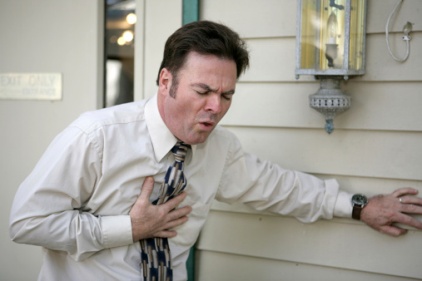Eating dinner after 7pm is worse for your health than a high salt diet
late night fridge pickers at higher risk of heart attack
Researchers assessed more than 700 adults with high blood pressure, to see what difference their diet and eating times made to their health.
The study examined the types of foods eaten, amount of salt consumed, whether breakfast was eaten regularly and timing of evening meals.
The research found that eating dinner late had the most significant impact on overnight blood pressure.
Having dinner within two hours of bed time did more damage than the long-established risk of having a high salt diet, the study found.
Cardiologists at the world’s largest heart conference said the study suggested that when people eat could be as important as what they eat.
One in four Britons suffers from high blood pressure – also known as hypertension – which is one of the key risks for heart disease.
In around 40 per cent of cases, blood pressure fails to drop properly overnight, sharply increasing the chance of heart attacks.
The study found that those who eat eat dinner late are almost twice as likely to suffer from “non-dipper hypertension” – when pressure fails to drop properly over night.
In total 24.2 per cent of those who ate dinner within two hours of bed suffered from blood pressure which did not drop sufficiently overnight, compared with 14.2 per cent of those who ate their evening meal earlier.
Experts said that eating late left the body on “high alert” encouraging the production of stress hormones, such as adrenaline, while it might also disrupt the circadian rhythms.
The research – the first to examine the links between late night eating and “non-dipper hypertension” said those who skipped breakfast were also more likely to fail to see an overnight dip in pressure.
But this had less impact than late night eating, and might have been explained by the fact those who ate late night were more likely to skip breakfast, researchers said.
Dr Ebru Özpelit, associate professor of cardiology, Dokuz Eylül University, Izmir, said modern life was encouraging people into “erratic” eating habits which could cause damage over time.
Speaking at the European Society of Cardiology Congress in Rome, she said: “We must define the ideal frequency and timing of meals because how we eat may be as important as what we eat.”
“Eating breakfast is important, we should have a strong breakfast, we shouldn’t skip lunch. We must have a small dinner and it mustn’t be later than 7 o’clock in the evening,” she said.
Dr Özpelit said the body was not designed to cope with many aspects of modern life.
“With the advent of affordable artificial lighting and industrialization, modern humans began to experience prolonged hours of illumination every day and resultant extended consumption of food,” she said.
Artificial lighting meant people were likely to eat far later in the day, when the body expected them to eat before nightfall, she suggested,
“Late night eating and skipping breakfast is such an erratic eating pattern which is becoming more prevalent day by day,” she said.

Blood pressure is supposed to drop by at least 10 per cent at night, to allow the body to rest. If it remains raised, it increases the risk of heart disease and heart attacks.
Previous studies have linked late night eating to a higher risk of obesity, and to insulin resistance, which can lead to diabetes.
And skipping breakfast has been linked with a greater chance of heart disease.
Dr Özpelit said that the new study suggested eating late at night had a far greater impact than missing the first meal of the day.
The observational study showed a large overlap between both habits, with 72 per cent of those who ate late also skipping breakfast.

But the findings suggested that the late night eating had poor consequences for blood pressure even among those who did eat breakfast.
Researchers said they hoped the results would be confirmed by large population-based studies, and called for more research examining exactly what and when people should eat, to protect their blood pressure.
Prof Weissberg said: “This research suggests that eating a meal late at night may contribute to the failure of their blood pressure to reduce. This observation, which needs to be confirmed in further, carefully designed studies, suggests that eating early in the evening may help people to gain better control of their blood pressure.”

